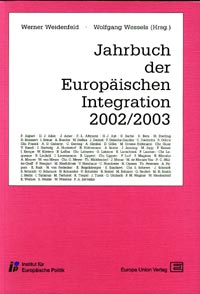Yearbook of European Integration 2002/2003

The Yearbook of European Integration published by the Institute for European Politics (IEP) in Berlin documents and balances the European integration process from 1980 to the present. The result is a uniquely comprehensive account of European contemporary history. The Yearbook of European Integration is a project of the Institute for European Politics (IEP), Berlin, funded by the German Federal Foreign Office and realized in cooperation with the Center for Applied Policy Research at the University of Munich. The aim of the book is to capture and evaluate each facet of the increasingly complex European politics.
The reporting period of the “Yearbook of European Integration 2002/2003” was characterized by two events of historic proportions: In Copenhagen, the accession negotiations with ten new member states were completed in December 2002, and in April 2003 the Accession Treaties for the biggest enlargement in the history of the EU were signed. Estonia, Latvia, Lithuania, Malta, Poland, Slovakia, Slovenia, the Czech Republic, Hungary, and Cyprus are supposed to join in May 2004. This enlargement will change the EU qualitatively as none has done previously. In July 2003 the European Convention submitted the first draft of a Constitution for the enlarged Union. Achievements have been made in the Convention that seemed to be impossible just a year before. The way forward to new reforms has been marked out.
Werner Weidenfeld/Wolfgang Wessels (Ed.): Jahrbuch der Europäischen Integration 2002/2003, Europa Union Verlag, Bonn 2003, 572 p., ca. 45.50,– EURO
ISBN 3–7713-0619–1, ISSN 0721–5436
The “Yearbook of European Integration” is funded by the German Federal Foreign Office. The IEP alone is responsible for the contents.
